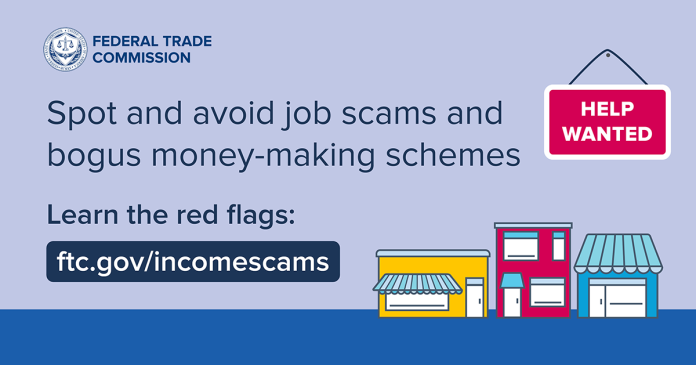Fake jobs and money making schemes are proliferating online, luring people who dream of starting their own businesses or who desperately need to earn quick cash. The pop-up ads are everywhere, from Facebook, Tik Tok, Instagram and WeChat to online job listing sites.
Sometimes, it’s an unexpected text or email: “You got the job! Work from home and earn top dollar!” Search online for “trading” or “investments,” and you’ll be bombarded with offers from self-proclaimed experts promising 20-30% returns in 1-3 months. EMS briefing on Aug 9 detailed through the latest scams targeting all of us, especially those targeting specific ethnic groups, and discussed how it’s fighting the scammers and winning cases.
Kathleen Daffan, Assistant Director, Division of Marketing Practices, Federal Trade Commission said a common scam involves scammers mailing fake checks to job applicants to get them to buy equipment or gift cards. After the purchase is successful, the job applicant discovers that the check is fake and the scammers can extract money from the gift card. She said that fake jobs and business investment scams have caused huge losses to the United States. In the first half of 2023 alone, the FTC received more than 26,000 fraud reports about similar scams, with reported losses exceeding $223 million, and these reports are just the tip of the iceberg.
One of the reasons for the FTC’s warning right now is the changing way people work. Since the outbreak, more and more people are working from home. “We live in a global economy. Now it’s normal to communicate with employers online, to conduct interviews, and it’s normal to collaborate with each other online.” People need to be vigilant. If someone sends you money and tells you that you need to buy something.
She said that the key to identifying these job hunting or money-making scams is to do the necessary search and online research, and search for keywords such as the name of the scammer company and the place that seems to be a scam to see if there are similar records.
Rosario Mendez, Attorney, Consumer & Business Education, Federal Trade Commission said in addition to being cautious in money transactions, personal information should not be easily revealed. She said that reporting scams should be brave and that reporting will not affect anyone’s immigration status. The Commission encourages everyone to email ReportFraud@ftc.gov or go to https://reportfraud.ftc.gov.
Vidya Sethuraman
India Post News Service







